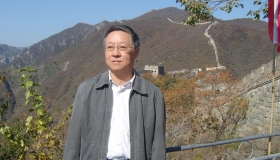学术讲座 | 能源时代的无线通信 & 任意成形约束条件的最优下行波束成形设计方案
2016年12月16日下午14:00 - 16:00,来自新加坡国立大学的张瑞教授以及来自上海复旦大学的王昕教授将为我们带来两场学术交流讲座,欢迎大家的加入!
Time & Date:
14:00 – 15:00, December 16, 2016
Venue:
Room 207, Cheng Dao Building
诚道楼207阶梯教室
Speaker:
Prof. Rui ZHANG
Associate Professor, National University of Singapore
Abstract
In this talk, we will introduce some recent advances in energy/power technologies including energy harvesting, smart grid, and wireless power transfer, as well as their applications in wireless communications. We will present the key challenges in designing wireless communication systems powered by these new energy supply methods, and point out some promising solution approaches. In particular, we will focus our discussion on wireless IoT (Internet of things) networks with low-power IoT devices powered by energy harvesting and/or wireless power transfer, and wireless cellular networks with base stations/relays powered by energy harvesting and/or smart grids. Promising directions for future research will also be highlighted.
About Speaker
Dr. Rui Zhang received the B.Eng. (First-Class Hons.) and M.Eng. degrees from National University of Singapore in 2000 and 2001, respectively, and the Ph.D. degree from Stanford University, Stanford, CA, USA in 2007, all in electrical engineering. From 2007 to 2009, he worked at the Institute for Infocomm Research, ASTAR, Singapore, where he now holds a Senior Scientist joint appointment. Since 2010, he has joined the Department of Electrical and Computer Engineering of National University of Singapore, where he is now an Associate Professor. His current research interests include energy-efficient and energy-harvesting-enabled wireless communication, wireless information and power transfer, MIMO communication, cognitive radio, cooperative communication, UAV-assisted communication, wireless information surveillance, and optimization methods. He has published over 250 papers, which have been cited more than 1,3000 times. He was the recipient of the 6th IEEE Communications Society Asia-Pacific Region Best Young Researcher Award in 2011, and the Young Researcher Award of National University of Singapore in 2015. He was the co-recipient of the IEEE Marconi Prize Paper Award in Wireless Communications in 2015, and the IEEE Communications Society Asia-Pacific Region Outstanding Paper Award in 2016. He has served for over 30 international conferences as TPC Co-Chair or Organizing Committee Members, and as the guest editor for 8 special issues in IEEE and other international journals. He has served as an elected member of the IEEE Signal Processing Society SPCOM and SAM Technical Committees, and the Vice Chair of the IEEE Communications Society Asia-Pacific Board Technical Affairs Committee. He has been the primary voting representative of IEEE Signal Processing Society in the IEEE Technical Committee on RFID (CRFID). He has been an editor for the IEEE Transactions on Wireless Communications, the IEEE Transactions on Signal Processing, the IEEE Journal on Selected Areas in Communications (Green Communications and Networking Series), and the IEEE Transactions on Green Communications and Networking. He has been listed in the World’s Most Influential Scientific Minds, also known as a Highly Cited Researcher, by Thomson Reuters since 2015.
Time & Date:
15:00 – 16:00, December 16, 2016
Venue:
Room 207, Cheng Dao Building
诚道楼207阶梯教室
Speaker:
Prof. Xin WANG
Distinguished Professor, Fudan University
Abstract
This talk addresses the beamforming design for a multiuser multiple-input single-output (MISO) downlink with an arbitrary number of (context-specific) shaping constraints. In this setup, the state-of-the-art beamforming schemes cannot attain the well-known performance bound promised by the semidefinite program (SDP) relaxation technique. To close the gap, we propose a redundant-signal embedded linear beamforming (REEL-BF) scheme, where each user is assigned with one information beamformer and several shaping beamformers. It is shown that the proposed REEL-BF scheme can perform general rank-K beamforming for user symbols in a low-complexity and structured manner. In addition, sufficient conditions are derived to guarantee that the REEL-BF scheme always achieves the SDP bound for linear beamforming schemes. Based on such conditions, an efficient algorithm is then developed to obtain the optimal REEL-BF solution in polynomial time.
About Speaker
Xin Wang received the B.Sc. and M.Sc. degrees from Fudan University, Shanghai, China, in 1997 and 2000, respectively, and the Ph.D. degree from Auburn University, Auburn, AL, USA, in 2004, all in electrical engineering. From 2004 to 2006, he was a Postdoctoral Research Associate with the Department of Electrical and Computer Engineering, University of Minnesota, Minneapolis. In 2006, he joined the Department of Computer and Electrical Engineering and Computer Science, Florida Atlantic University, Boca Raton, FL, USA, as an Assistant Professor, and then an Associate Professor from August 2010. He is currently a Distinguished Professor with the Department of Communication Science and Engineering, Fudan University. He has served as an Associate Editor for the IEEE Transactions on Signal Processing, the IEEE Transactions on Vehicular Technology, and the IEEE Signal Processing Letters. His research interests include stochastic network optimization, energy-efficient communications, cross-layer design, and signal processing for communications.
- 上一篇
- 下一篇




